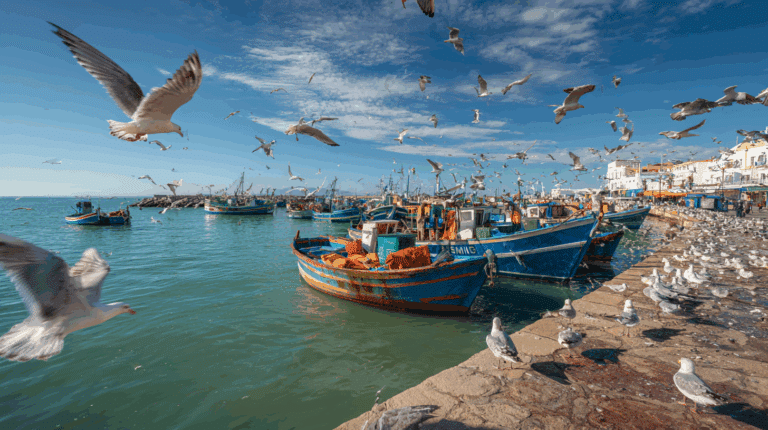Estepona’s Coastal Fishing Heritage
Nestled along the stunning Costa del Sol, Estepona’s fishing heritage is a testament to the town’s deep-rooted connection with the Mediterranean Sea. This charming coastal gem has long been a haven for fishermen, their traditions shaping the local culture and cuisine for generations. Today, we embark on a journey to explore the rich maritime history and vibrant fishing culture that continues to thrive in this picturesque Andalusian town.
A Glimpse into Estepona’s Fishing Past
Estepona’s history as a fishing village dates back centuries, with evidence of maritime activities found in archaeological sites along the coast. The town’s strategic location on the Mediterranean has made it an ideal spot for fishing communities to flourish. Over the years, Estepona’s fishing heritage has evolved, adapting to changing times while preserving its core traditions.
In the early 20th century, Estepona’s fishing industry experienced significant growth, becoming a vital part of the local economy. Families passed down fishing techniques from generation to generation, creating a strong sense of community and shared knowledge. This period saw the development of the town’s fishing port, which remains a hub of activity to this day.
Traditional Fishing Techniques: A Living Legacy
One of the most fascinating aspects of Estepona’s fishing heritage is the preservation of traditional fishing methods. Local fishermen still employ time-honored techniques that have been refined over centuries. These include:
- Trasmallo: A type of gillnet used to catch various species of fish
- Palangre: A long-line fishing method effective for catching larger fish
- Cerco: A purse seine technique used for catching schools of fish
These traditional methods not only ensure the quality of the catch but also contribute to the sustainability of local fish populations. Visitors can often witness these techniques in action early in the morning as fishermen set out to sea or return with their daily catch.
The Heart of Estepona’s Maritime Culture: The Fishing Port
No exploration of Estepona’s fishing heritage would be complete without a visit to the town’s vibrant fishing port. This bustling hub serves as the beating heart of Estepona’s maritime culture, where tradition meets modernity in a colorful display of activity.
The port comes alive in the early hours as fishing boats return laden with the day’s catch. Visitors can witness the lively fish auction, where restaurateurs and locals alike bid for the freshest seafood. The port area is also home to several excellent seafood restaurants, where you can savor the fruits of the fishermen’s labor in authentic Andalusian style.
For those interested in delving deeper into Estepona’s fishing heritage, the port offers guided tours that provide insights into the fishing industry’s history and current practices. These tours offer a unique opportunity to connect with local fishermen and learn about their way of life.
Sustainable Fishing: Preserving Estepona’s Maritime Future
While proud of its traditions, Estepona is also committed to ensuring the sustainability of its fishing industry. In recent years, there has been a growing focus on implementing environmentally friendly fishing practices to protect marine ecosystems and ensure the longevity of fish populations.
Local fishermen, in collaboration with marine biologists and conservation organizations, have adopted several sustainable fishing methods:
- Seasonal fishing restrictions to allow fish populations to replenish
- Use of more selective fishing gear to reduce bycatch
- Implementation of size limits to protect juvenile fish
- Participation in marine protected area initiatives
These efforts not only contribute to the preservation of marine biodiversity but also ensure that Estepona’s fishing heritage can continue to thrive for future generations.
From Sea to Table: Estepona’s Culinary Treasures
The rich fishing heritage of Estepona is perhaps most deliciously expressed in its local cuisine. The town’s restaurants offer an array of seafood dishes that showcase the freshness and quality of the local catch. Some must-try delicacies include:
- Espeto de sardinas: Sardines grilled on bamboo skewers over an open fire
- Fritura malagueña: A mixed platter of fried fish and seafood
- Arroz a banda: A flavorful rice dish cooked in fish stock
- Boquerones en vinagre: Fresh anchovies marinated in vinegar and olive oil
These dishes not only tantalize the taste buds but also offer a direct connection to the town’s maritime heritage. Many local restaurants work closely with fishermen to ensure they serve the freshest catch of the day, maintaining the farm-to-table ethos that has been a part of Estepona’s culture for centuries.
Celebrating Estepona’s Maritime Traditions
Throughout the year, Estepona hosts several festivals and events that celebrate its fishing heritage. The most notable of these is the Virgen del Carmen festival, held annually on July 16th. This colorful celebration honors the patron saint of fishermen and features a procession of boats carrying the saint’s statue out to sea, accompanied by music, dancing, and fireworks.
Another important event is the Feria y Fiestas Mayores de Estepona, typically held in early June. While not exclusively focused on fishing, this festival includes many maritime-themed activities and showcases the town’s seafood specialties.
These events provide visitors with a unique opportunity to immerse themselves in Estepona’s vibrant culture and witness firsthand the deep connection between the town and its maritime heritage.
Preserving the Legacy for Future Generations
As Estepona continues to grow and evolve, efforts are being made to ensure that its rich fishing heritage is preserved and celebrated. The town has invested in educational programs that teach young people about traditional fishing methods and the importance of marine conservation. Additionally, local museums and cultural centers feature exhibits dedicated to Estepona’s maritime history, helping to keep these traditions alive in the public consciousness.
For visitors, exploring Estepona’s fishing heritage offers a unique and authentic way to connect with the heart and soul of this charming coastal town. Whether you’re watching the fishing boats return to port, savoring fresh seafood at a local restaurant, or participating in a traditional festival, you’ll be experiencing a vital part of Estepona’s identity that has shaped its past and continues to influence its future.
As you walk along Estepona’s beautiful beaches or stroll through its picturesque old town, take a moment to appreciate the maritime legacy that surrounds you. It’s a legacy of hard work, tradition, and a deep respect for the sea – one that continues to enrich the lives of locals and visitors alike.
To further explore the coastal wonders of Estepona, don’t miss our article on Coastal Wonders of Southern Spain, which highlights some of the area’s most beautiful beaches and hidden coves. For those interested in the culinary aspects of Estepona’s fishing heritage, our guide to Flavors of the Mediterranean Coast offers insights into the local gastronomy scene.
Estepona’s fishing heritage is more than just a part of its history – it’s a living, breathing aspect of the town’s identity that continues to shape its present and future. By embracing and celebrating this heritage, Estepona ensures that its maritime traditions will continue to thrive for generations to come.







